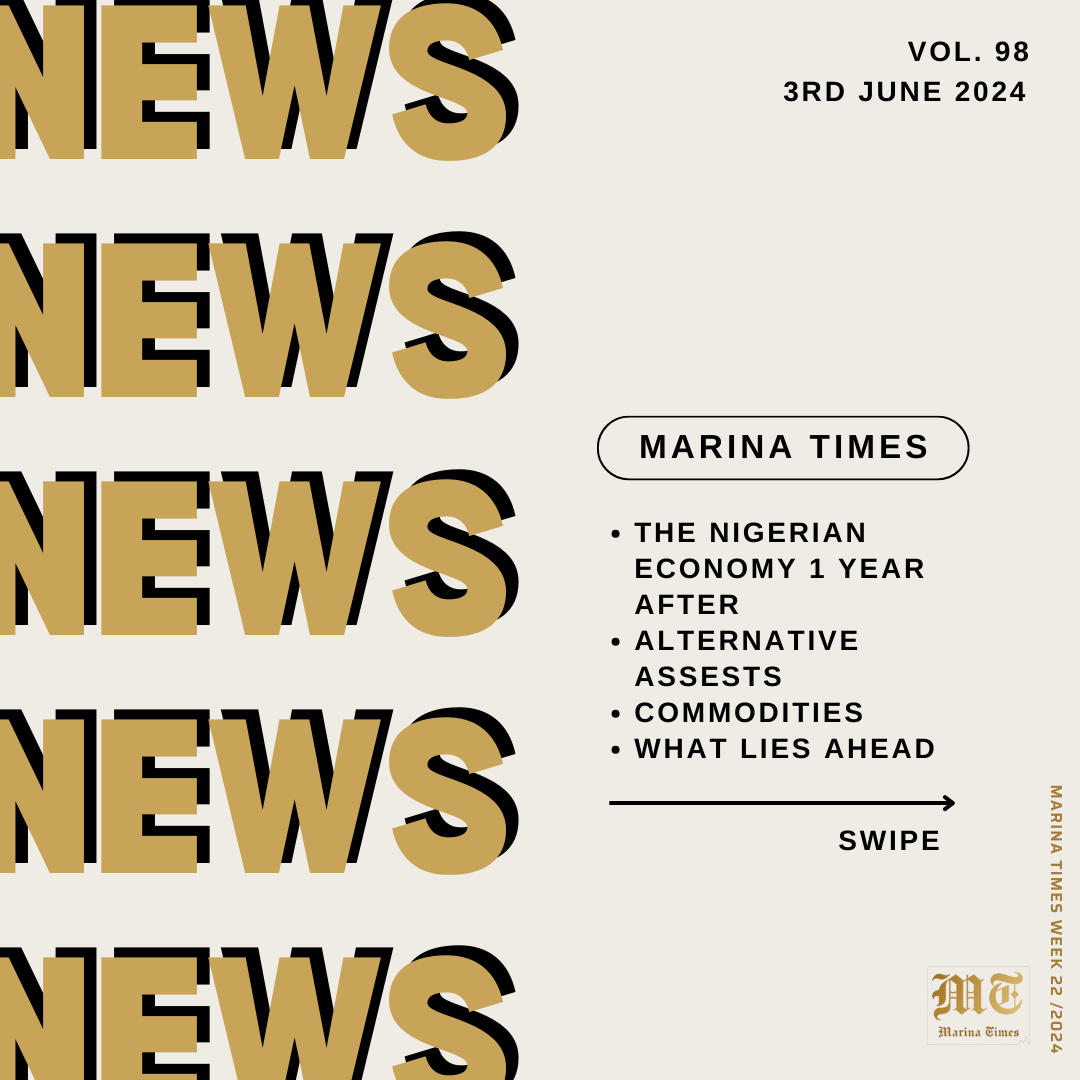

On Wednesday, May 29, 2024, President Bola Ahmed Tinubu’s administration marked its first year in office. A year characterised by fast-paced developments in many ways giving some the impression that it has been much longer than a year. Upon assuming office in 2023, one of President Tinubu’s earliest actions was the swift removal of the fuel subsidy. Although Nigerians have had to swallow some bitter pills in the last year, it is clear that the policy tone is apt and that economic conditions can only improve over time.
In the last year, Nigerian markets have experienced considerable volatility. A year ago, the unofficial (black market) exchange rate was approximately $/₦750, but it has since devalued to trade very close to $/₦2,000 this year. At the moment, analysts are starting to suggest that the fair value for the currency at this time is somewhere between $/₦1,200 and $/₦1,500. Regardless of the trend, as confidence is rebuilt, the exchange rate outlook is for the Naira to revalue.
Driven by various domestic and international factors, headline inflation rose from 22.41% in May 2023 to 33.69% in April 2024. The Monetary Policy Rate (MPR) has been increased by 775bps from 18.5% to 26.25% since May 29th, 2023. Interest rates have inched up within the period in tandem with monetary policy efforts to tackle inflation and stabilize the currency.
At the NTB auction conducted on the 24th of May 2023, the 364-day bill was allotted at a discount rate of 7.99%. In comparison, the stop rate for the 364-day bill at the last NTB auction conducted on the 22nd of May 2024 was a 20.69% discount. There has also been a lot of regulatory intervention via the conduct of Open Market Operations (OMO) auctions. At the last OMO auction (on the 29th of May 2024), the benchmark 1-year instrument was allotted at a 22.34% discount.
According to the Nigerian Exchange Limited (NGX), Foreign Portfolio Investment (FPI) in the Nigerian stock market surged by 167.8% year-on-year (YoY) to ₦118.92 billion in February 2024, an increase from the ₦44.52 billion reported in February 2023. This increase has been attributed to enhanced liquidity in the foreign exchange (FX) market following reforms by the Central Bank of Nigeria (CBN).
On Wednesday last week, the CBN issued ₦500 billion worth of OMO bills to a cross-section of investors. The auction featured 90-day, 174-day, and 363-day tenors, respectively. The OMO auction recorded a little above ₦900 billion subscriptions in just two (2) out of the three (3) tenors – specifically, the 174-day and 363-day tenors. It is noteworthy that there was no subscription for the 90-day tenor. The 174-day closed at 19.6400% and the 363-day closed at 22.3400%. In contrast to the previous auction, where the 91-day benchmark closed at 18.9900%, the 182-day closed at 19.7400%, and the 364-day tenor closed at 22.4900%.
The Nigerian Senate Committee on Capital Markets has called for cryptocurrency regulation to protect investors already engaged in digital asset trading. The committee chairman, Mr Osita Izunaso, argues that regulation is the only logical step to take since authorities have failed to stop residents from trading crypto assets.
Despite having one of the largest crypto markets globally, Nigeria has not maintained a coherent position on crypto assets, an inconsistency evident in the differing stances of the Central Bank of Nigeria (CBN) and the Securities and Exchange Commission (SEC). While the SEC has consistently signalled its willingness to regulate crypto assets, the CBN took measures to suppress the growth of crypto trading.
The departure of former Central Bank of Nigeria (CBN) Governor, Mr Godwin Emefiele, led to a gradual shift in the CBN’s stance on cryptocurrencies. However, when the local currency rapidly depreciated against the U.S. dollar earlier this year, Nigerian authorities targeted alleged currency speculators using crypto exchange platforms like Binance.
Since then, Nigerian officials have taken measures to restrict crypto trading, including ordering global crypto exchange platforms to delist the local currency. Additionally, the West African nation has taken strong actions against Binance, accusing the platform of facilitating currency manipulation.
During the week, approximately 37,000 Bitcoin (BTC), valued at around $2.53 billion, were withdrawn from cryptocurrency exchanges, as reported by crypto analyst Ali Martinez. This significant movement coincided with a more than 6.5% decline in Bitcoin’s price, dropping from $71,979 to $67,128.
Many of these withdrawals originated from Kraken, a prominent centralised exchange based in the United States. Kraken facilitates numerous transactions in both USDT and
Bitcoin, directly and through over-the-counter (OTC) trades. This detail suggests that large investors, or “whales,” are moving their assets to various exchange pools or for use in ETFs.
In a related development, the U.S. SEC has advised potential issuers of spot Ethereum ETFs to submit their revised Forms S-1. The SEC will begin its review process, which may lead to further amendments and possible approval of these financial products.
The large withdrawals and recent actions by the SEC are viewed as positive strides for the market. When significant amounts of Bitcoins are moved off exchanges, it often indicates that investors are opting to hold their assets for the long term, reflecting confidence in the cryptocurrency’s value.
Moreover, spot Ethereum ETFs could potentially attract more institutional investors, enhancing the market’s legitimacy and appeal. Despite some prolonged uncertainty, the overall outlook remains optimistic. The substantial Bitcoin withdrawals, coupled with regulatory advancements, suggest a strengthening market environment for cryptocurrencies.
At the global level, the weekly prices of the two (2) foremost cryptocurrencies can be seen below:
As OPEC+ members are discussing their production policy for the remainder of 2024, the group has re-opened a debate over each producer’s capacity to pump oil. These oil production capacities will become the basis for any output quotas under the OPEC+ deal for 2025, prompting several producers to push for higher capacity estimates.
In November 2023, OPEC announced that as part of its Declaration of Cooperation (as the OPEC+ agreement is officially known), independent consultancies will review members’ production capacities in 2024. As such, at the end of June 2024, all OPEC and non-OPEC countries subject to the Declaration of Cooperation shall go through an assessment by three independent sources – IHS, Wood Mackenzie, and Rystad Energy (specialised in oil
upstream sources) to identify each members’ production capacity to form a reference of 2025 production levels.
Over the past few years, OPEC has been engaging in a long, complicated dispute over how much each country claims to be able to produce. The higher the oil production capacity, the higher the respective countries’ production quota under the deal.
Last year, OPEC+ readjusted some quotas, giving the United Arab Emirates (UAE), OPEC’s third-largest producer, a higher quota while reducing Angola’s. The adjustment in quotas ultimately prompted Angola’s departure from OPEC at the end of 2023.
At a meeting in June 2023, Angola and Nigeria were given lower crude oil production quotas as part of the OPEC+ agreement after the two producers had underperformed and failed to pump to their quotas for years due to a lack of investment in new fields and maturing older oilfields.
The new month has commenced with a bitter-sweet tone as nationwide labour strike actions intensify. Labour Unions are determined to see the minimum wage increased to make life bearable for the populace in view of inflationary trends. While many argue that the wage demands are unrealistic, others counter by stressing the unreal inflation across the country. Despite this sour squint, the Minister of Finance and Coordinating Minister of the economy of Nigeria has categorically pointed out in a recent interview that he is confident that inflation is retreating and that policy measures taken thus far will address the current economic challenges.
We continue to expect Foreign Direct Investments in Nigeria’s power, gas and oil sectors and these injections should help stabilise the currency. Although many traders expect interest rates to crash in the near future, some market analysts foresee elevated interest rates until inflation clearly bows down, given the aggressive tone of regulators. The Naira should strengthen from here on.